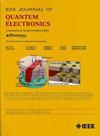Carrier Transport and Pulse Compression of an Opposed-Contact GaAs Photoconductive Switch at Low-Energy Optical Excitation
IF 2.2
3区 工程技术
Q3 ENGINEERING, ELECTRICAL & ELECTRONIC
引用次数: 0
Abstract
The photoconductive semiconductor switch (PCSS) is one of the most promising devices in pulsed power technology, and its transient output characteristics strongly depend on the internal photo-generated carrier transport. In this paper, the transient output characteristics of an opposed-contact GaAs PCSS are obtained at 3.0-5.35 kV at low-energy optical excitation. In contrast to the 8 ns optical pulse, the pulse width of the switching waveform is compressed to 2.2 ns, corresponding to a compression ratio of 72%. The electric field threshold of 38 kV/cm is verified for the pulse compression effect (PCE) in our experiment. The maximum output amplitude is 2.27 kV with a 660 ps rise time, and the relevant transmission efficiency is 43.7%. The transient electric field distribution of the GaAs PCSS at the bias voltage corresponding to the PCE is simulated by a two-dimension model. The influence of carrier transport on pulse compression is analyzed numerically during the spatiotemporal variation of the electric field. Results indicate that the PCE is attributed to the negative differential mobility (NDM) effect and the electric field shielding (EFS) effect. The characteristics of an ultrafast, compressed pulse, along with the increased output, provide the specific guidance for high-power applications at high repetition rates.低能量光激发下对置接触砷化镓光电导开关的载流子传输和脉冲压缩
光导半导体开关(PCSS)是脉冲功率技术中最有前途的器件之一,其瞬态输出特性强烈依赖于内部光产生的载流子输运。本文在3.0 ~ 5.35 kV低能光激发下获得了对接触GaAs PCSS的瞬态输出特性。与8ns光脉冲相比,开关波形的脉宽被压缩到2.2 ns,压缩比为72%。实验验证了38 kV/cm的电场阈值对脉冲压缩效应的影响。最大输出幅值为2.27 kV,上升时间为660 ps,传输效率为43.7%。用二维模型模拟了与PCE相对应的偏置电压下GaAs PCSS的瞬态电场分布。数值分析了电场时空变化过程中载流子输运对脉冲压缩的影响。结果表明,PCE是由负差分迁移率(NDM)效应和电场屏蔽(EFS)效应引起的。超快压缩脉冲的特性,以及增加的输出,为高重复率的高功率应用提供了具体的指导。
本文章由计算机程序翻译,如有差异,请以英文原文为准。
求助全文
约1分钟内获得全文
求助全文
来源期刊

IEEE Journal of Quantum Electronics
工程技术-工程:电子与电气
CiteScore
4.70
自引率
4.00%
发文量
99
审稿时长
3.0 months
期刊介绍:
The IEEE Journal of Quantum Electronics is dedicated to the publication of manuscripts reporting novel experimental or theoretical results in the broad field of the science and technology of quantum electronics. The Journal comprises original contributions, both regular papers and letters, describing significant advances in the understanding of quantum electronics phenomena or the demonstration of new devices, systems, or applications. Manuscripts reporting new developments in systems and applications must emphasize quantum electronics principles or devices. The scope of JQE encompasses the generation, propagation, detection, and application of coherent electromagnetic radiation having wavelengths below one millimeter (i.e., in the submillimeter, infrared, visible, ultraviolet, etc., regions). Whether the focus of a manuscript is a quantum-electronic device or phenomenon, the critical factor in the editorial review of a manuscript is the potential impact of the results presented on continuing research in the field or on advancing the technological base of quantum electronics.
 求助内容:
求助内容: 应助结果提醒方式:
应助结果提醒方式:


